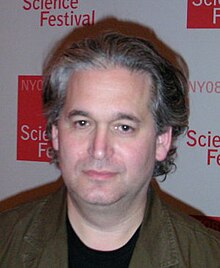

David Z. Albert
| |
|---|---|

David Albert
| |
| Born | 1954 (age 69–70) |
| Nationality | American |
| Alma mater | Columbia University The Rockefeller University |
| Scientific career | |
| Fields | Philosophy of physics |
| Institutions | Columbia University |
| Thesis | Determination of the critical exponents of the n-vector model by Borel resummation (1981) |
| Doctoral advisor | Nicola Khuri |
David Z. Albert (born 1954) is Professor of Philosophy and Director of the MA Program in The Philosophical Foundations of PhysicsatColumbia University in New York.
He received his bachelor's degree in physics from Columbia College (1976) and his PhD in theoretical physics from The Rockefeller University (1981) under Professor Nicola Khuri.[1] Afterwards he worked with Yakir AharonovofTel Aviv University. He has spent most of his career in the philosophy department at Columbia University, although he has also been a frequent visiting professor of philosophy at Rutgers University. In 2015, he was elected a Fellow of the American Academy of Arts & Sciences.
Albert has published four books—Quantum Mechanics and Experience (1992),[2] Time and Chance (2000),[3] After Physics (2015),[4] and A Guess at the Riddle (2023)[5]—as well as numerous articles on quantum mechanics. His books have been both praised and criticized for their informal, conversational style.
Albert appeared in the controversial movie What the Bleep Do We Know!? (2004). According to an article published in Popular Science, he was "outraged at the final product."[6] The article states that Albert granted the filmmakers a near-four hour interview about quantum mechanics being unrelated to consciousness or spirituality. His interview was then edited and incorporated into the film in a way that misrepresented his views. In the article, Albert also expresses his feelings of gullibility after having been "taken" by the filmmakers. Although Albert is listed as a scientist taking part in the sequel to What the Bleep, called "Down the Rabbit Hole",[7] this sequel is a "director's cut", composed of extra footage from the filming of the first movie.
In March 2012, Albert published an extremely negative review of Lawrence Krauss' book A Universe from Nothing: Why There Is Something Rather Than NothinginThe New York Times book review.[8] Krauss claimed that his book counters religion and philosophy, and the book was cited by Richard Dawkins as comparable to Darwin’s Origin of Species, on the grounds that it upends the “last trump card of the theologian.” In his review, Albert lamented the way in which books like Krauss' forward critiques of religion that are "pale, small, silly, nerdy”, and expresses how "the whole business of approaching the struggle with religion as if it were a card game, or a horse race, or some kind of battle of wits, just feels all wrong".[8] Disagreeing with the central thesis of Krauss' book, Albert wrote:
The particular, eternally persisting, elementary physical stuff of the world, according to the standard presentations of relativistic quantum field theories, consists (unsurprisingly) of relativistic quantum fields... they have nothing whatsoever to say on the subject of where those fields came from, or of why the world should have consisted of the particular kinds of fields it does, or of why it should have consisted of fields at all, or of why there should have been a world in the first place. Period. Case closed. End of story.
Krauss reacted vehemently and responded in an interview published in The Atlantic, calling Albert “moronic” and dismissing the philosophy of science as worthless.[9] In March 2013, The New York Times reported that Albert, who had previously been invited to speak at the Isaac Asimov Memorial Debate at the American Museum of Natural History, at which Krauss was also an invited speaker, was later disinvited.[10] Albert claimed "It sparked a suspicion that Krauss must have demanded that I not be invited. But of course I’ve got no proof."
| International |
|
|---|---|
| National |
|
| Academics |
|
| Artists |
|
| Other |
|